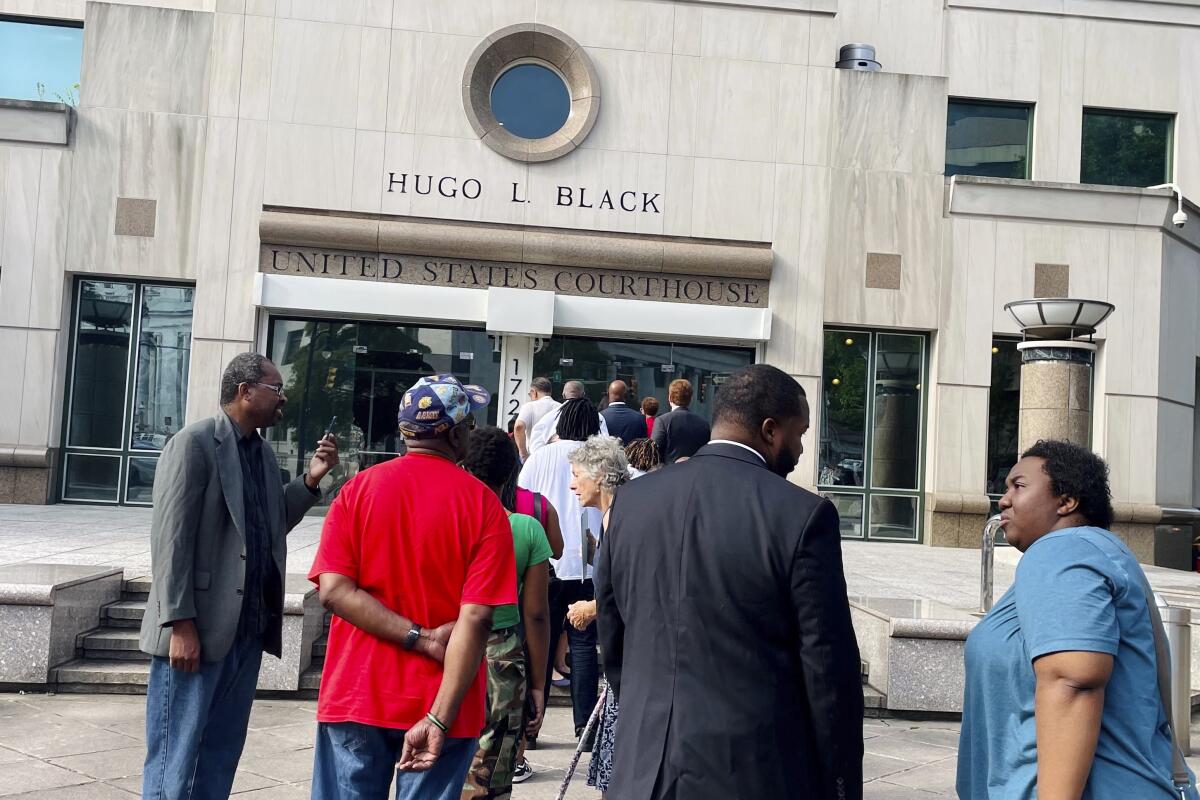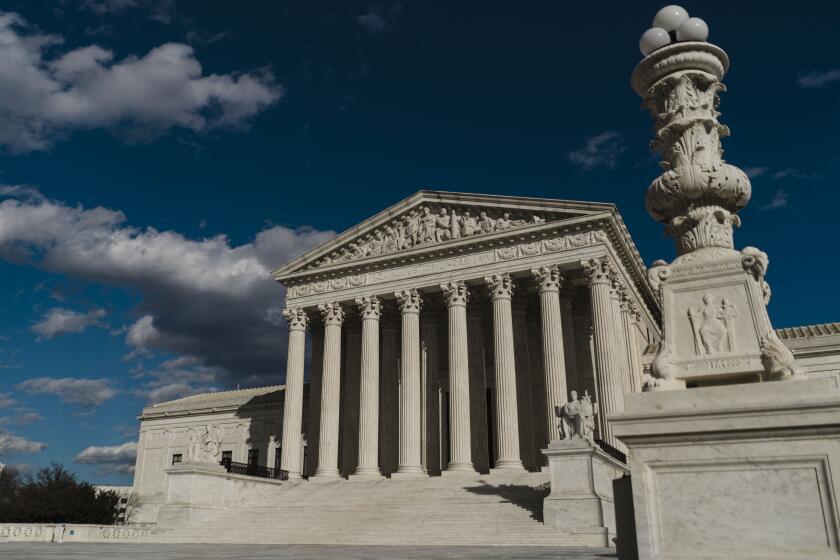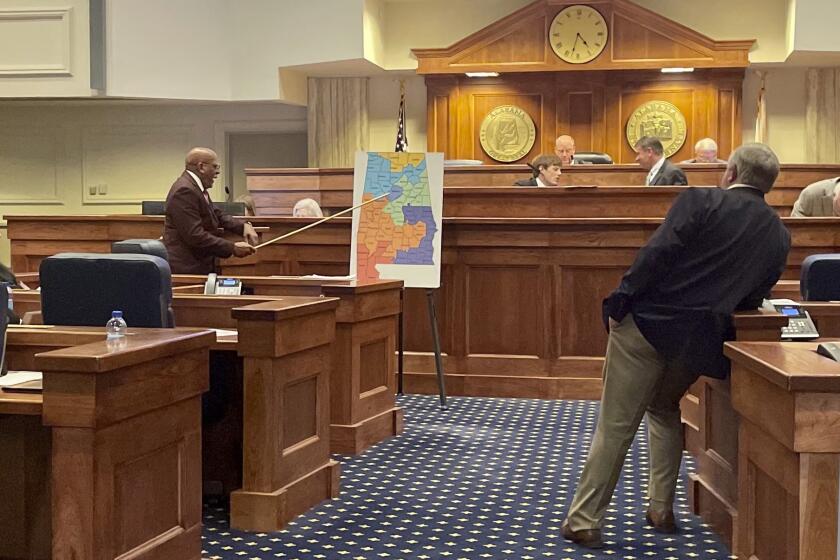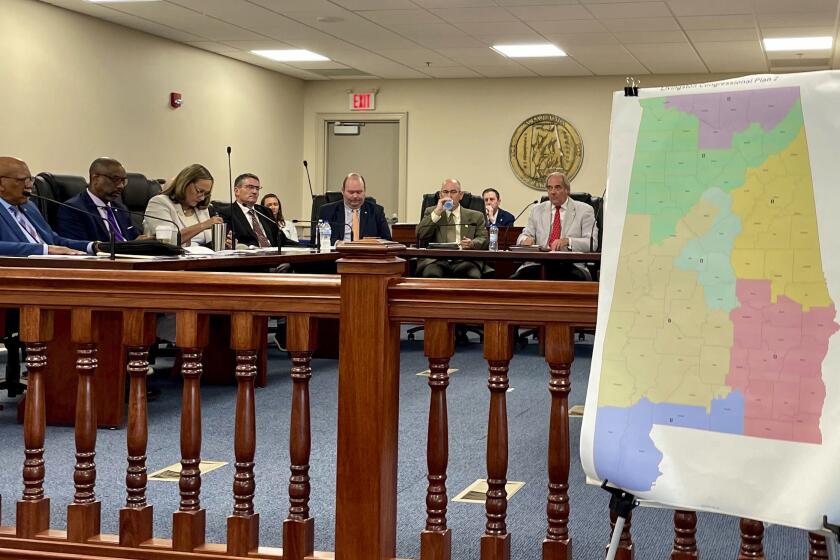Judges reject Alabama’s congressional lines, will draw new districts to increase Black voting power

- Share via
MONTGOMERY, Ala. — A panel of federal judges said Tuesday that it would draft new congressional lines for Alabama after lawmakers refused to create a second district where Black voters at least came close to constituting a majority, as suggested by previous court rulings.
In blocking the newly drawn congressional map, the three-judge panel wrote that it is “deeply troubled” that Alabama lawmakers flouted its instruction to create a second majority-Black district or something close to it. A designated special master will be tapped to draw new districts for the state, the judges ordered.
“This is a significant step toward equal representation for Black Alabamians,” said former U.S. Atty. Gen. Eric H. Holder Jr., chairman of the National Democratic Redistricting Committee, which backed one of the court challenges that led to the decision.
The Supreme Court upholds the reach of the Voting Rights Act, ruling that Alabama must draw an election district that would likely favor a Black Democrat.
The Alabama attorney general’s office did not immediately respond to an email seeking comment. The state is expected to appeal the decision to the U.S. Supreme Court.
The Republican-controlled Alabama Legislature hastily drew new lines this summer after the U.S. Supreme Court in June upheld the panel’s finding that the map — that had one majority-Black district out of seven in a state where 27% of residents are Black — probably violated the federal Voting Rights Act.
The three-judge panel, in striking down Alabama’s map in 2022, said the state should have two districts where Black voters have an opportunity to elect their preferred candidates. Because of racially polarized voting in the state, that map would need to include a second district where Black voters are the majority or “something quite close,” the judges wrote.
Redrawn map defies court mandate to create a second district in which Black voters have a chance to influence the election outcome, opponents argue.
Alabama lawmakers in July approved a new map that maintained a single majority-Black district and boosted the percentage of Black voters in another district, District 2, from about 30% to almost 40%.
“We are not aware of any other case in which a state legislature — faced with a federal court order declaring that its electoral plan unlawfully dilutes minority votes and requiring a plan that provides an additional opportunity district — responded with a plan that the state concedes does not provide that district,” the judges wrote in the ruling rejecting the new map.
The group of Black voters who filed one of the two lawsuits that led to the order likened Alabama’s defiance in the case to that of segregationist Gov. George Wallace, who tried to defy court orders to desegregate.
“History is repeating itself and the district court’s decision confirms that Alabama is again on the losing side. We demand that Alabama again move out of the way and obey our laws — we demand our voting rights,” plaintiffs said in a statement.
Alabama lawmakers have refused to create a second majority-Black congressional district, which could trigger a new battle over the state’s political map.
In a hearing last month, all three judges pointedly questioned the state’s solicitor general about the state’s refusal to create a second majority-Black district.
Alabama argued that the map complied with the Voting Rights Act and the Supreme Court decision in the case. The state said that justices did not require the creation of a second majority-Black district if doing so would mean violating traditional redistricting principles, such as keeping communities of interest together.
“District 2 is as close as you are going to get to a second majority-Black district without violating the Supreme Court’s decision,” Alabama Solicitor Gen. Edmund LaCour said during oral arguments.
Abha Khanna, an attorney representing one group of plaintiffs in the case, argued during the hearing that Alabama chose “defiance over compliance.”
“Alabama has chosen instead to thumb its nose at this court and to thumb its nose at the nation’s highest court and to thumb its nose at its own Black citizens,” Khanna said.
More to Read
Get the L.A. Times Politics newsletter
Deeply reported insights into legislation, politics and policy from Sacramento, Washington and beyond. In your inbox three times per week.
You may occasionally receive promotional content from the Los Angeles Times.













